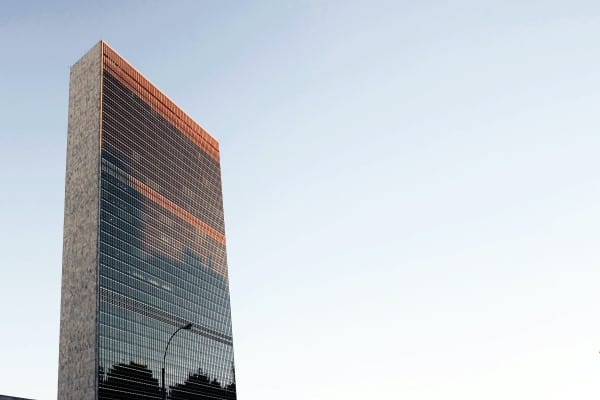This page contains affiliate links. This means if you a follow a link and make a purchase, at no additional cost to you, Humanitarian Careers will receive a commission. Thank you for supporting the site.
Working at the United Nations can be a fantastic career. UN staff are part a prestigious organisation working to address some of the world’s biggest issues. With high salaries, chances to travel and exciting career opportunities, it’s no wonder UN jobs are in demand. Although UN jobs can be competitive, there are actually some UN positions that are as easier to get…
The easiest jobs to get at the UN are the Junior Professional Officer jobs and roles in the Young Professional Programme. Other UN jobs seen as easier to get include lower-level General Service (G) and Professional (P) roles, as well as UN Volunteer postings, UN internships and some UN consultancies.
Now you know some UN jobs are easier to get then others, let’s break down what makes these UN jobs easier to secure.
Junior Professional Officer (JPO)
One of the easiest jobs to get at the United Nations is as a Junior Professional Officer (JPO). JPOs are recruited for the UN Secretariat. Each JPO position is funded by a donor country, with different country’s allocating funds to a specific number of JPO positions within the UN Secretariat.
JPO jobs are some of the easiest to get at the UN because only nationals of the donor country can apply for a specific JPO position. This makes JPO jobs at the UN easier to get as it limits the competition from other nationals.
The aim of the JPO programme is to give young professionals the opportunity to gain hands-on field experience within the United Nations. As the JPO is aimed as an entry-level job within the UN, it is one of the easiest UN jobs to get. JPO’s contribute to many different areas of UN operations and becoming a JPO is one of the best ways to start a career in the UN.
The JPO programme is specifically aimed at trainings the next generation of UN staff and so tries to bring in less experienced staff and develop them. Therefore, it is designed to be an easier UN job to get.
Application requirements for JPO positions in the UN differ depending on the donor country. However, most UN JPO jobs require applicants to have a post-graduate degree and be under a certain age (usually early 30s). Some JPO jobs require a few years of professional experience. You can check all the JPO job requirement by donor by checking the UN’s website.
As can be seen, application requirements for JPO jobs can be significantly lower than most UN jobs, which is why JPO positions are considered some of the easiest jobs to get at the UN.
Young Professional Programme
The United Nations Young Professionals Programme (YPP) aims to recruit talented, qualified professionals to begin careers within the UN. The YPP is designed to bring staff into the UN at an entry-level and is considered one of the easier jobs to get at the UN.
The YPP recruits incoming staff to fill gaps needed within the United Nations and trains new UN staff to be international civil servants to UN standards. This is another reason why the YPP is considered one of the easiest jobs to get at the UN.
Staff on the UN YPP are offered a two-year fix-term contract at either P-1 or P-2 level within the UN Secretariat. P-1 and P-2 levels are the most junior levels of Professional staff within the UN, which is one of the reasons why YPP jobs are some of the easier jobs to get within the UN.
After staff on the YPP have completed their two-year fixed-term contract they may be offered an extension or another position within the UN. This makes the YPP on the best, and easiest, ways to start a career within the UN.
To join the YPP applicants need to complete an entry exam. The UN YPP entrance exam is held once a year. Although the exam can be tough, passing the exam means you join the YPP and can mean you get into the UN without prior professional experience – making the YPP one of the easier UN jobs to get.
One of the aims of the YPP is to recruit UN staff from under represented countries. This can also mean it is easier for nationals of country’s that do not already have a lot of staff working within the UN to get a UN job within the YPP.
United Nations Online Courses
If you are interested in working for the United Nations, we highly recommend the online course United Nations Jobs Guide. It’s a great overview of the UN recruitment system and includes valuable tips for anyone looking to build a career within the United Nations. Follow the link to the course’s page.
We also think the United Nations CV and Cover Letter online course is a must for anyone looking to get a job in the UN. It goes through exactly what is needed when applying for a UN position and provides guidance on what exactly to include. It also shows students what the UN recruitment process is like. Follow the link to get full details on the course.
An important step for those wanting to work for the United Nations is to get a strong understanding of how the UN works, and what its global role is. We recommend the online course Global Diplomacy: The United Nations in the World offered by SOAS in London. Not only does it give a fantastic overview of the UN; the fact it is offered by SOAS – one of the top colleges in the world for international relations studies, makes it a great addition to the CV of anyone applying for a job at the UN. Click the link for more information.
UN Volunteers
The United Nations Volunteer (UNV) programme provides qualified volunteers to humanitarian, peace and development projects worldwide. As a volunteer programme, UNV is considered one of the easiest jobs to get at the UN. UNV is managed through the United Nations Development Programme (UNDP).
UN Volunteers can be deployed abroad, or work in their own country or online, all factors that contribute to the ease of getting a UNV position.
UN Volunteers often have some practical or technical expertise that the UN requires for a specific operation. Although UNV positions can be entry-level, they can also be a way for more experienced people from outside the UN to get UN experience. This helps make UNV jobs some of the easier UN jobs to get as people with the right skills and experience can often secure UN Volunteer roles. UNV jobs are requested by specific UN agencies for designated tasks they require support for.
Applicants interested in becoming UN Volunteers require:
- 25 years old and older (no upper age limit).
- University degree or higher technical diploma.
- At least two years of relevant work experience in a professional background.
- Good working knowledge of at least one of UNV’s three working languages: English, French or Spanish.
- Commitment to the values and principles of volunteerism.
- Ability to work in a multicultural environment.
- Willingness to work with people and local organizations to draw upon the synergies between expert solutions and local knowledge.
- Ability to adjust in difficult living conditions and sometimes remote locations.
- Strong interpersonal and organizational skills.
- Prior volunteering and/or working experience in a developing country is an asset.
When applying for a UN Volunteer position, recruits often apply to the UNV roster. Once accepted for the UNV roster, you are approved for deployments into UNV positions once one arises. Although this can mean waiting for a position to come up, it can also make UNV jobs easier to get as you can continue to gain professional experience outside the UN whilst waiting on the UNV roster for a posting.
UN Internship Programme
The United Nations internship programme is aimed at recruiting interns for many UN departments. UN interns gain first-hand experience of UN operations whilst building solid knowledge of international diplomacy and public policy. UN internships are aimed young professional looking to start their career within the UN, and therefore are considered some of the easier UN jobs to get.
UN interns work directly within UN teams and are supported by senior management, making it a great mentoring opportunity for young professionals looking for a career in the United Nations.
Requirements for UN internships usually include being enrolled in a bachelors, masters or PhD programme, as well as excellent English or French language skills. This can mean UN internships are especially easy for students to get. UN internships generally last at least two month and can be as long as six months. This means they fit around study and work commitments – an aspect making UN internships easier to complete. Sadly, UN internships are not paid.
UN interns need to apply directly to the UN agency recruiting the intern position. This can make UN internships easier to get as applicants can specialise and focus on the specific UN agencies, they are most qualified for. Below is a breakdown of UN agencies recruiting internships:
- United Nations Development Programme (UNDP)
- United Nations Children’s Fund (UNICEF)
- United Nations Populations Fund (UNFPA)
- United Nations Office for Project Services (UNOPS)
- United Nations Refugee Agency (UNHCR)
- United Nations Environment Programme (UNEP)
United Nations internships can be a great way to begin a career in international diplomacy and gain strong professional work experience. Specifically aimed at student, recent graduates and young professionals, a UN internship is generally considered to be one of the easiest UN jobs to get.
UN General Service Staff (G1 – 3)
General Service staff are UN staff recruited locally in countries the UN operates. General Service jobs usually cover administrative roles, including secretarial and clerical support, as well as specialised local positions such as security and premises management. General Service jobs, especially the lower G1 – 3 roles, are seen as some of the easiest jobs to get in the UN. This is because they are recruited locally and specifically cover more generalised types of jobs.
The UN recruits General Service staff at different levels depending on their previous experience. G1 – 3 jobs require the least experience and so are seen the easiest General Service jobs to get at the UN.
| Level | Experience Required |
| G1 | No work experience required |
| G2 | Minimum 2 years work experience |
| G3 | Minimum 3 years work experience |
| G4 | Minimum 5 years work experience |
| G5 | Minimum 5 years work experience |
| G6 | Minimum 6 years work experience |
| G7 | Minimum 7 years work experience |
The UN sets out the entry requirements required to join as a General Service staff member. These can differ for specific General Service jobs, but are usually:
- High school diploma or equivalent.
- Minimum age of 18 years.
- Required number of years of work experience relevant to the job and its level, as specified in the job opening.
- Language requirements depending on the job and the location of the office. Most jobs require fluency in one of the two working languages, English or French.
Usually for General Service UN jobs, these requirements are considered to be entry-level. This makes General Service jobs some of the easiest jobs to get at the UN. As well as meeting the job requirements, applicants to General Service jobs at the UN are required to complete the Global General Services Test (GGST). The aim of the GGST is to equalise recruitment for General Service staff roles within the UN, which is another reason why General Service jobs are seen as some of the easiest UN jobs to get.
UN Professionals (P2)
UN staff recruited in Professional positions are normally recruited internationally and serve many different duty stations throughout their career. The easiest Professional jobs to get at the UN are P-2. P-1 jobs are reserved for UN JPO positions.
Professional level jobs at the UN oversee management, operations and programmes across the United Nations. Professional level jobs at the UN are usually hired in specific roles, which means if you have skills needed, they can be some of the easier UN jobs to get.
At the UN, the level of Professional job is determined by the amount of experience that applicants need for the role:
| Entry-Level Professionals | Experience Needed | Mid-Career Professionals | Experience Needed | Senior-level Professionals | Experience Needed |
| P-2 | 2 years | P-4 | 7 years | P-6/D-1 | 15 years |
| P-3 | 5 years | P-5 | 10 years | P-7/D-2 | 15 years |
UN P-2 jobs require at least 2 years’ professional experience, making them one of the easier UN jobs to get. As well as having the required number of years’ experience, applicants for Professional level jobs within UN also usually need:
- Advanced university degree (masters or above) or First level degree combined with additional professional experience.
- Positions in certain job families, including military, civilian police, medical, conference services may have different standards for the minimum educational requirements, which are accordingly reflected in their respective job opening.
- Required number of years of work experience relevant to the job and its level, as specified in the job opening.
- Native English and/or French, plus an additional United Nations language.
Although the requirements for Professional UN positions become more demanding as the positions are more senior, P-2 level jobs require lower standards and are seen as more entry level. This means that P-2s are the easiest Professional level job to get at the UN. Another advantage of the P-2 role is that it is seen as one of the easier ways to begin a career within the UN, as Professional level staff within the UN are often hired on a permanent basis and are able to continue to develop their career within the United Nations.
UN Consultant
The United Nations hires consultants to work on designated projects to deliver specific results. Hired at external members of staff, the UN sees consultants as a recognised authority or specialist in specific field.
Although consultants hired by the UN often need to be highly trained in their specialist areas, those who do have the required skills and experience can find getting a UN consultancy to be quite easy. UN consultants work for set-period of time to deliver the project outcomes they are hired for. As UN consultant can be short-term hiring’s, they can be an easier launch-pad into a full UN career.
Each UN agency has its own requirements for consultancy. However, across the UN consultants are not usually hired for more than 11 straight months. This can mean high turn-over of UN consultants, another aspect that can make it an easer UN job to get.
The UN usually sees consultants as external service providers tasked with delivering specific results. Although this often means the work is highly skilled, as the UN agency does not have internal capacity to achieve the results, it also means those with highly relevant skills and experience can quite easily become UN consultants.
Most UN agencies hire three different types of consultant:
- International consultants may be hired from outside the location where they have to perform the services (place of work).
- Locally hired international consultants are not nationals of the country in which they are to serve and have been hired at the place of work.
- National consultants are nationals of the country and have been hired at the place of work
Depending on what nationality and location you are trying to work, becoming a UN consultant can be easy if you are able to provide the specific services and skills the United Nations requires at that time.
Applicant requirements to a UN consultant differ depending on the exact consultancy role. Generally, though UN consultants need to have significant experience and trainings in their area of expertise. The UN hires consultants to provide technical guidance or complete work requiring a specific set of skills of expertise. This means UN consultancies are rarely entry-level roles. However, for those with several years of professional experience, often in a niche area, UN consultancies can be easy to secure.
If you want to learn more about the United Nations, and how to get a UN job, explore our list of the top UN online courses here.




